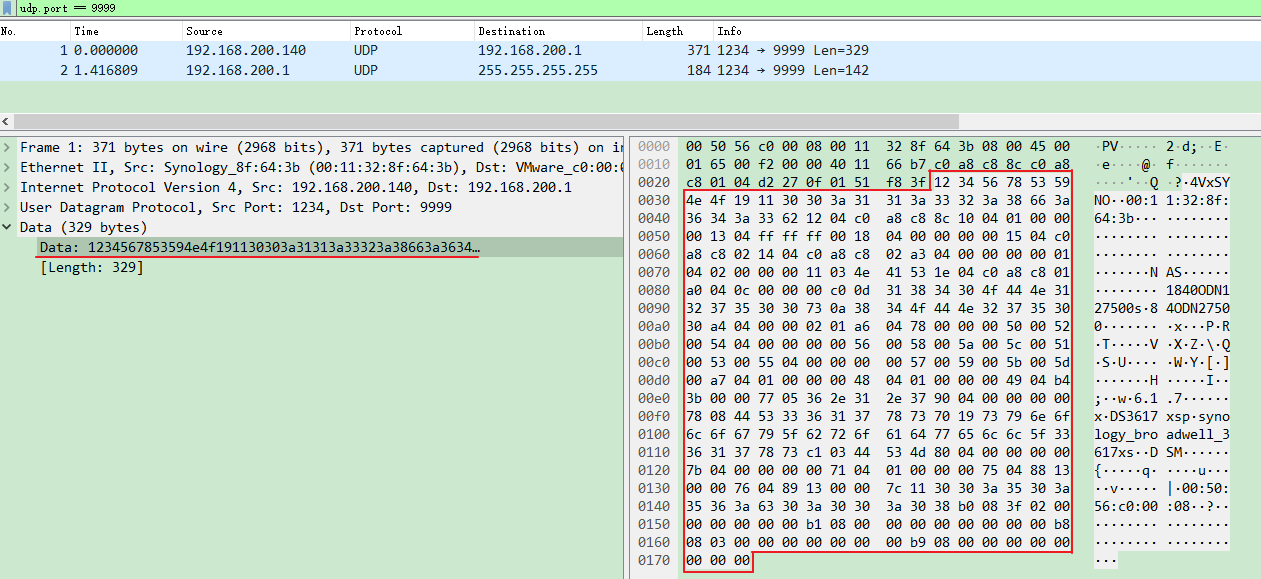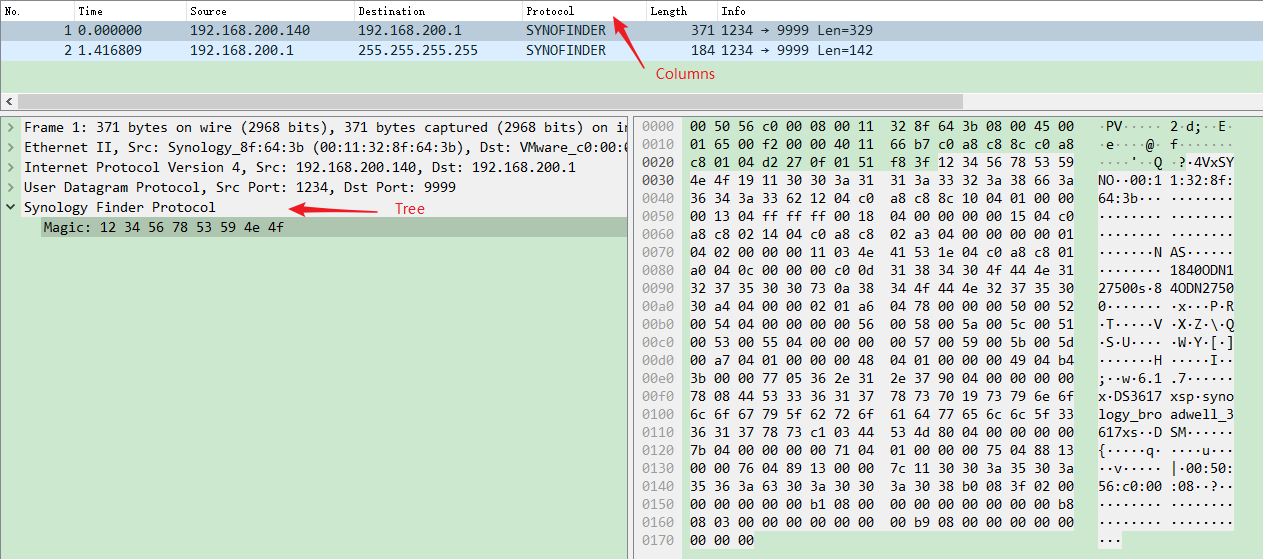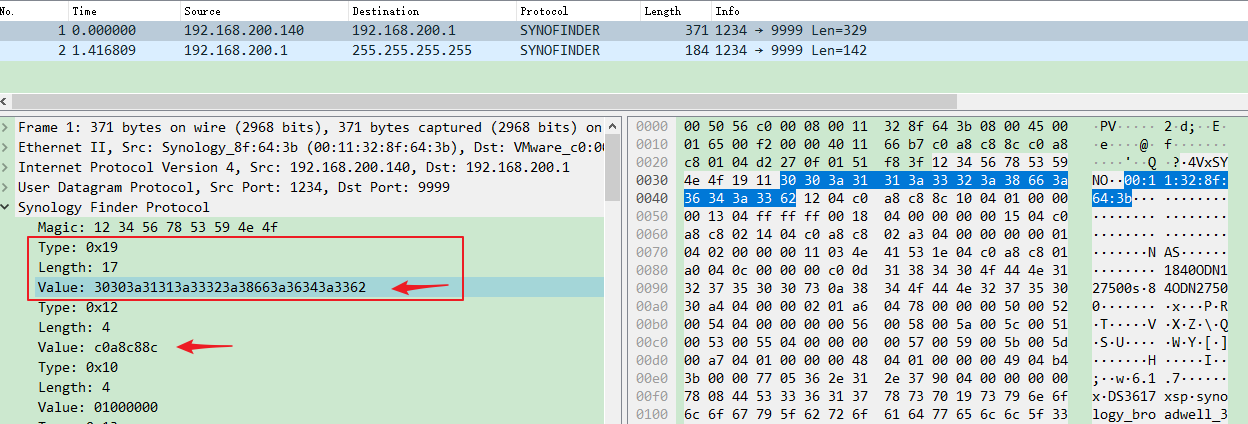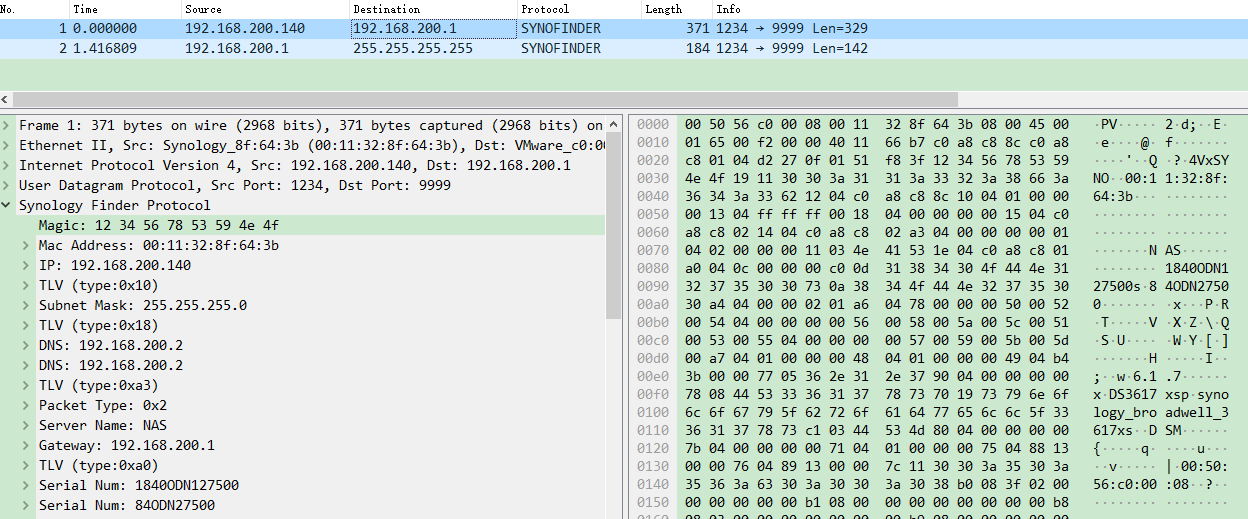1
2
3
4
5
6
7
8
9
10
11
12
13
14
15
16
17
18
19
20
21
22
23
24
25
26
27
28
29
30
31
32
33
34
35
36
37
38
39
40
41
42
43
44
45
46
47
48
49
50
51
52
53
54
55
56
57
58
59
60
61
62
63
64
65
66
67
68
69
70
71
72
73
74
75
76
77
78
79
80
81
82
83
84
85
86
87
88
89
90
91
92
93
94
95
96
97
98
99
100
101
102
103
104
105
106
107
108
109
110
111
112
113
114
115
116
117
118
119
120
121
122
123
124
125
126
127
128
129
130
131
132
133
134
135
136
137
138
139
140
141
142
143
144
145
146
147
148
149
150
151
152
153
154
155
156
157
158
159
160
161
162
163
164
165
166
167
168
169
170
171
172
173
174
175
176
177
178
179
180
181
182
183
184
185
186
187
188
189
190
191
192
193
194
195
196
197
198
199
200
201
202
203
204
205
206
207
208
209
210
211
212
213
214
215
216
217
218
219
220
221
222
223
224
225
226
227
228
229
230
231
232
233
234
235
236
237
238
239
240
241
242
243
244
| local synoFinderProtocol = Proto("SynoFinder", "Synology Finder Protocol")
local protoName = "syno_finder"
local typeNames = {
[0x1] = "Packet Type",
[0x11] = "Server Name",
[0x12] = "IP",
[0x13] = "Subnet Mask",
[0x14] = "DNS",
[0x15] = "DNS",
[0x19] = "Mac Address",
[0x1e] = "Gateway",
[0x20] = "Packet Subtype",
[0x21] = "Server Name",
[0x29] = "Mac Address",
[0x2a] = "Password",
[0x4a] = "Username",
[0x4b] = "Share Folder",
[0x70] = "Arch",
[0x73] = "Serial Num",
[0x77] = "Version",
[0x78] = "Model",
[0x7c] = "Mac Address",
[0xc0] = "Serial Num",
[0xc1] = "Category"
}
local magic = ProtoField.bytes(protoName .. ".magic", "Magic", base.SPACE)
local type = ProtoField.uint8(protoName .. ".type", "Type", base.HEX, typeNames)
local length = ProtoField.uint8(protoName .. ".length", "Length")
local value = ProtoField.bytes(protoName .. ".value", "Value")
local packetType = ProtoField.uint32(protoName .. ".packet_type", "Packet Type", base.HEX)
local serverName = ProtoField.string(protoName .. ".username", "Server Name")
local ipAddress = ProtoField.ipv4(protoName .. ".ip_address", "IP")
local ipMask = ProtoField.ipv4(protoName .. ".subnet_mask", "Subnet Mask")
local dns = ProtoField.ipv4(protoName .. ".dns", "DNS")
local macAddress = ProtoField.string(protoName .. ".mac_address", "Mac Address")
local ipGateway = ProtoField.ipv4(protoName .. ".gateway", "Gateway")
local packetSubtype = ProtoField.uint32(protoName .. ".packet_subtype", "Packet Subtype", base.HEX)
local password = ProtoField.string(protoName .. ".password", "Password")
local arch = ProtoField.string(protoName .. ".arch", "Arch")
local username = ProtoField.string(protoName .. ".username", "Username")
local shareFolder = ProtoField.string(protoName .. ".share_folder", "Share Folder")
local version = ProtoField.string(protoName .. ".version", "Version")
local model = ProtoField.string(protoName .. ".model", "Model")
local serialNum = ProtoField.string(protoName .. ".serial_num", "Serial Num")
local category = ProtoField.string(protoName .. ".category", "Category")
local value8 = ProtoField.uint8(protoName .. ".value", "Value", base.HEX)
local value16 = ProtoField.uint16(protoName .. ".value", "Value", base.HEX)
local value32 = ProtoField.uint32(protoName .. ".value", "Value", base.HEX)
local typeFields = {
[0x1] = packetType,
[0x11] = serverName,
[0x12] = ipAddress,
[0x13] = ipMask,
[0x14] = dns,
[0x15] = dns,
[0x19] = macAddress,
[0x1e] = ipGateway,
[0x20] = packetSubtype,
[0x21] = serverName,
[0x29] = macAddress,
[0x2a] = password,
[0x4a] = username,
[0x4b] = shareFolder,
[0x70] = arch,
[0x73] = serialNum,
[0x77] = version,
[0x78] = model,
[0x7c] = macAddress,
[0xc0] = serialNum,
[0xc1] = category
}
local typeFormats = {
[0x1] = function (value)
return string.format("0x%x", value:le_uint())
end,
[0x11] = function (value)
return value:string()
end,
[0x12] = function (value)
return value:ipv4()
end,
[0x13] = function (value)
return value:ipv4()
end,
[0x14] = function (value)
return value:ipv4()
end,
[0x15] = function (value)
return value:ipv4()
end,
[0x19] = function (value)
return value:string()
end,
[0x1e] = function (value)
return value:ipv4()
end,
[0x20] = function (value)
return string.format("0x%x", value:le_uint())
end,
[0x21] = function (value)
return value:string()
end,
[0x29] = function (value)
return value:string()
end,
[0x2a] = function (value)
return value:string()
end,
[0x4a] = function (value)
return value:string()
end,
[0x4b] = function (value)
return value:string()
end,
[0x70] = function (value)
return value:string()
end,
[0x73] = function (value)
return value:string()
end,
[0x77] = function (value)
return value:string()
end,
[0x78] = function (value)
return value:string()
end,
[0x7c] = function (value)
return value:string()
end,
[0xc0] = function (value)
return value:string()
end,
[0xc1] = function (value)
return value:string()
end
}
synoFinderProtocol.fields = {
magic,
type, length, value,
packetType, serverName, ipAddress, ipMask, ipGateway, macAddress, dns, packetSubtype, password, arch, username, shareFolder, version, model, serialNum, category,
value8, value16, value32
}
function getFieldName(field)
local fieldString = tostring(field)
local i, j = string.find(fieldString, ": .* " .. protoName)
return string.sub(fieldString, i + 2, j - (1 + string.len(protoName)))
end
function getFieldType(field)
local fieldString = tostring(field)
local i, j = string.find(fieldString, "ftypes.* " .. "base")
return string.sub(fieldString, i + 7, j - (1 + string.len("base")))
end
function getFieldByType(type, length)
local tmp_field = typeFields[type]
if(tmp_field) then
return tmp_field
else
if length == 4 then
return value32
elseif length == 2 then
return value16
elseif length == 1 then
return value8
else
return value
end
end
end
function formatValue(type, value)
local tmp_func = typeFormats[type]
if(tmp_func) then
return tmp_func(value)
else
return ""
end
end
function synoFinderProtocol.dissector(buffer, pinfo, tree)
local buffer_length = buffer:len()
if buffer_length == 0 then return end
pinfo.cols.protocol = synoFinderProtocol.name
local subtree = tree:add(synoFinderProtocol, buffer(), "Synology Finder Protocol")
subtree:add_le(magic, buffer(0, 8))
local offset = 0
local payloadStart = 8
while payloadStart + offset < buffer_length do
local tlvType = buffer(payloadStart + offset, 1):uint()
local tlvLength = buffer(payloadStart + offset + 1, 1):uint()
local valueContent = buffer(payloadStart + offset + 2, tlvLength)
local tlvField = getFieldByType(tlvType, tlvLength)
local fieldName = getFieldName(tlvField)
local description
if fieldName == "Value" then
description = "TLV (type" .. ":" .. string.format("0x%x", tlvType) .. ")"
else
description = fieldName .. ": " .. tostring(formatValue(tlvType, valueContent))
end
local tlvSubtree = subtree:add(synoFinderProtocol, buffer(payloadStart+offset, tlvLength+2), description)
tlvSubtree:add_le(type, buffer(payloadStart + offset, 1))
tlvSubtree:add_le(length, buffer(payloadStart + offset + 1, 1))
if tlvLength > 0 then
local fieldType = getFieldType(tlvField)
if string.find(fieldType, "^IP") == 1 then
tlvSubtree:add(tlvField, buffer(payloadStart + offset + 2, tlvLength))
else
tlvSubtree:add_le(tlvField, buffer(payloadStart + offset + 2, tlvLength))
end
end
offset = offset + 2 + tlvLength
end
if payloadStart + offset ~= buffer_length then
Dissector.get("data"):call(buffer(payloadStart+offset):tvb(), pinfo, tree)
end
end
local udp_port = DissectorTable.get("udp.port")
udp_port:add(9999, synoFinderProtocol)
|



